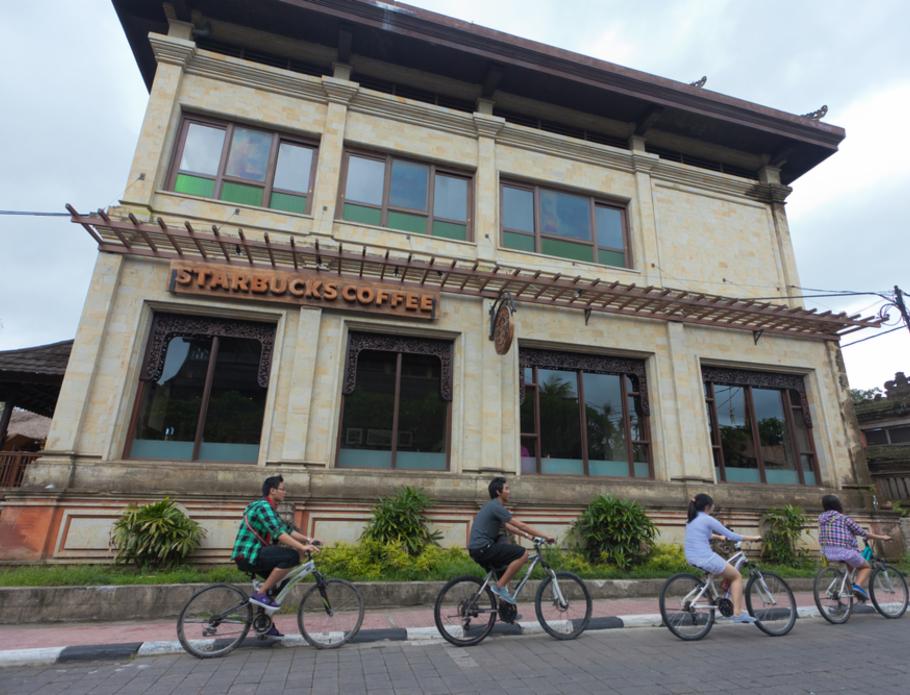
How to get halal-certified in Indonesia: COO of Starbucks and Burger King retailer
Photo: UBUD, BALI, INDONESIA - FEB 3, 2012: Young people cycling past Starbucks. There were 180 Starbucks outlets across Indonesia in 2014 / Paul Prescott / Shutterstock.com
With over 90 percent of Indonesia’s population Muslim, food and beverage companies that want to target mainstream consumers must consider applying for local halal certifications.
The road to halal certification may seem daunting and complex for first-timers but going step by step should make the process run smoothly.
| STEPS TO GETTING A HALAL CERTIFICATE FOR F&B IN INDONESIA |
|
First, you have to go to the Indonesian Ulema Council (MUI), the nation’s top Muslim clerical body and the only acknowledged halal certification organization in the country. Start the application process by registering your firm online at www.Halalmui.org or www.e-lppommui.org. (LPPOM is the MUI Food and Drug Analysis Agency) Users must fill out a special form and attach the following items to it:
|
| 1. Specifications and existing halal certificates of all ingredients your company uses |
| 2. Other existing halal certificates or a halal notification letter from an MUI regional branch (for local products) or a halal certificate from an overseas certifying institution that has also been acknowledged by the MUI (for imported products). It is important to note that this only applies to products derived from animals |
| 3. A Halal Assurance System manual |
| 4. A production flow chart |
| 5. Any and all data on your company, its products and the ingredients used in them |
HALAL CERTIFICATES OF ALL INGREDIENTS
For the first point, you have to ask your vendors or suppliers to provide their halal certificates for any ingredient they supply for your products or menu.
“We register the ingredients together with their certificates into Cerol, the MUI online system,” said Anthony Cottan in an interview with Salaam Gateway. Cottan is COO of Mitra Adiperkasa, Indonesia’s largest lifestyle retailer, which also operates international restaurant and café chains throughout the nation, including Starbucks, Domino’s, Burger King, and Genki Sushi.
Cottan said that for imported products, the certification process took a bit longer, as local halal project leaders must liaise with the company’s international brand managers to ensure everything is done properly. However, Cottan said that dealing with local vendors does make certification faster and easier.
HALAL ASSURANCE SYSTEM MANUAL
The Halal Assurance System has to be documented in detail in a manual book format. All employees have to be educated in both the Halal Assurance System and the standard operating procedure for how to uphold that assurance.
HALAL AUDIT
After the forms are submitted and verified, a team of auditors from the MUI Food and Drug Analysis Agency (LPPOM) will conduct an audit at the location of production for the specific food and beverage business.
If the results of the audit and lab tests pass inspection, the LPPOM will submit a report to the MUI Fatwa Commission, the group that will ultimately decide whether to grant a business halal status or not.
BIGGEST CHALLENGE
The biggest challenge in getting halal-certified in Indonesia, according to Cottan, is this: “When an imported ingredient doesn’t have halal documentation or when MUI doesn’t recognize a halal certificate, we have to find an alternative ingredient which is confirmed to be halal. Sometimes (the international brand manager) is not keen on localizing an ingredient.”
If the commission approves the halal status of a food and beverage operation, MUI will then issue an official halal certificate, which is good for the next two years provided that the business does not deviate from the current ingredients being used.
STAYING HALAL
A company whose products have obtained halal certificates also has to appoint a halal internal auditor as a part of its Halal Assurance System. The auditor’s task is to evaluate whether the Halal Assurance System is properly implemented. If there is any change in the ingredients used for a product, the auditor has to report immediately to the LPPOM to get approval from the agency.
COST OF HALAL CERTIFICATION
Overall, Cottan said, the cost and duration of getting halal-certified varies from brand to brand. “For Krispy Kreme, which had 16 outlets in 2014, the process took four months and cost around Rp 35 million ($2,581) or an average of Rp 2.2 million ($162) per outlet,” he said.
“But for Starbucks, with 180 stores in 2014, it took nine months due to many ingredients being imported that did not yet have halal certificates recognized by MUI. The total cost here was Rp 230 million ($16,961) or Rp 1.3 million ($96) per outlet.”
According to Cottan, administrative fees make up around 70 percent of the total cost of getting a food and beverage brand halal-certified. The rest goes toward maintaining that status. “The remaining 30 percent is for accommodation and transportation of audit purposes to each store.”
© Copyright SalaamGateway.com 2016

Heru Nainggolan